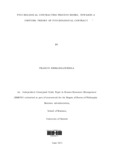| dc.description.abstract | In contemporary literature of the psychological contract construct, there are numerous
operational definitions adapted by researchers with little or no explicit consideration of other
competing views on the subject (Del Campo, 2007). This paper aims to reconcile the
divergent usage of the construct terminologies by developing in detail the theoretical process
model for psychological contracting. The basic question addressed in this paper is the, what is
psychological contract. Taking the term contract generally to be the cognate of the
psychological contract construct, then hypothetically the term is an experience which has
sequential process steps in its actualization. These steps constitute a model that the
psychological contracting action follows. The model is a dyadic relationship which captures
the realistic nature of a contractual relationship hence an epistemic departure from the present
unilateral tract adapted by researchers. The process model has been developed through
articulated understanding of other concepts and the knowledge of their blending (Bruner,
1960) by considering the antecedent of psychological contract namely linguistic theory of
performative speech act or communicative action and its social psychological implication in
context of contractual relationship in which a promise is taken as a contract, based on axiom
of moral obligation to perform other than indemnified by the law.
The process model of psychological contracting has three essential imperatives that
ontologically are necessary conditions for its existence. These are psychological contract
formation/effort imperative (i.e. input layer comprising of communicative action),
instrumentation/activation imperative (i.e. processing elements layer comprising of
promissory obligations & expectations) and psychological contract state (output layer). The
three imperatives constitute the priori of the psychological contract and the posteriori
constitutes of the two intertwined domains presented as outcome and impact of the contract state, which manifests as affections and subsequent behaviors of the dyads. The two
intertwined domains represent contract valence as result of the dyads' expectations
inconsistency/dissonance or consistency/consonance as result of the contract state. The basic
overarching goal of promise making is primarily building trust and resultant loyalty which
secondarily encapsulates cooperative, coordination and commitment, in the dyadic
relationship caused by the contextual consequence of psychological contract outcome's
affections and impact's behaviors (i.e. at the posteriori phase of the psychological contract).
The process model signifies a unifying theory of psychological contract which is an epistemic
bridging of the knowledge gap that has yielded to numerous contemporary definitions of the
construct. | en_US |



